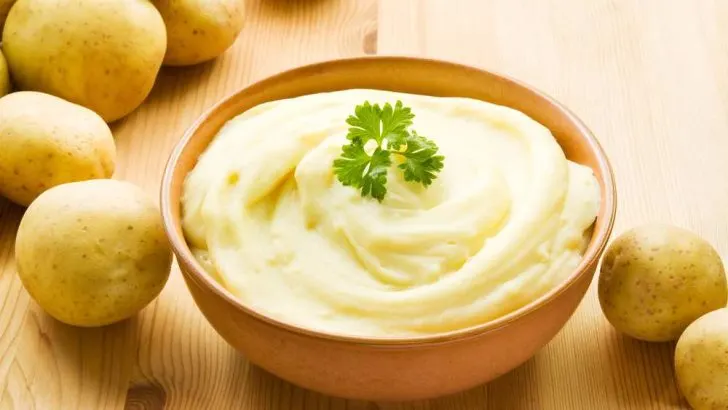Mashed potatoes are a staple food in many households. You probably eat them at least once a week, mainly as a side dish.
Whether boxed or homemade, mashed potatoes are a tasty meal for the whole family.
But is this also true for your dog?
The next time you have mashed potatoes for lunch, you may ask yourself:
Can dogs eat mashed potatoes? Is it safe to feed my dog mashed potatoes? Are they healthy for them?
Today, we will answer all of these questions and much more, so read on!
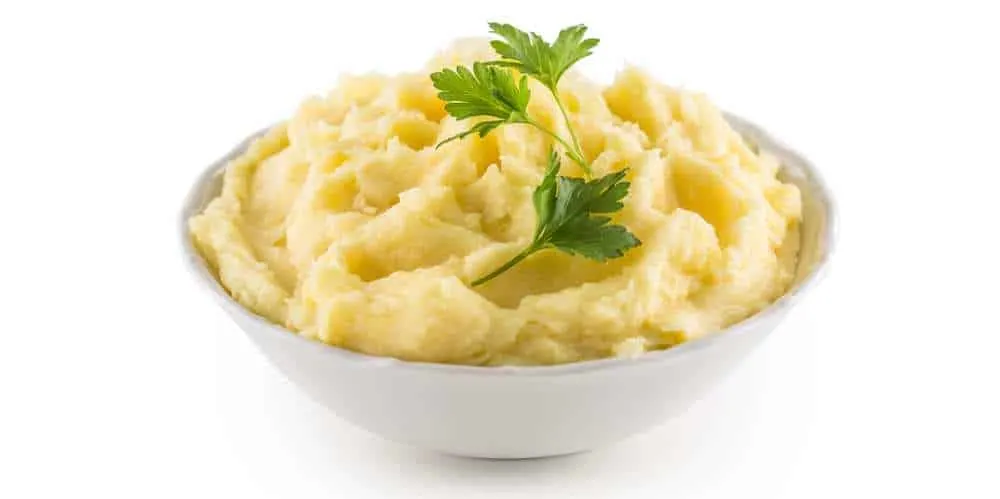
Can Your Pet Eat Mashed Potatoes?
The answer to this question is YES! Mashed potatoes are safe for your pet, but there is a catch! You see, when it comes to feeding your canine friend potatoes, it all depends on the preparation.
Although dogs are omnivores just like us, that doesn’t mean they can eat all the same foods as we humans can.
You can harm your pup’s health if you feed it mashed or even plain potatoes the wrong way.
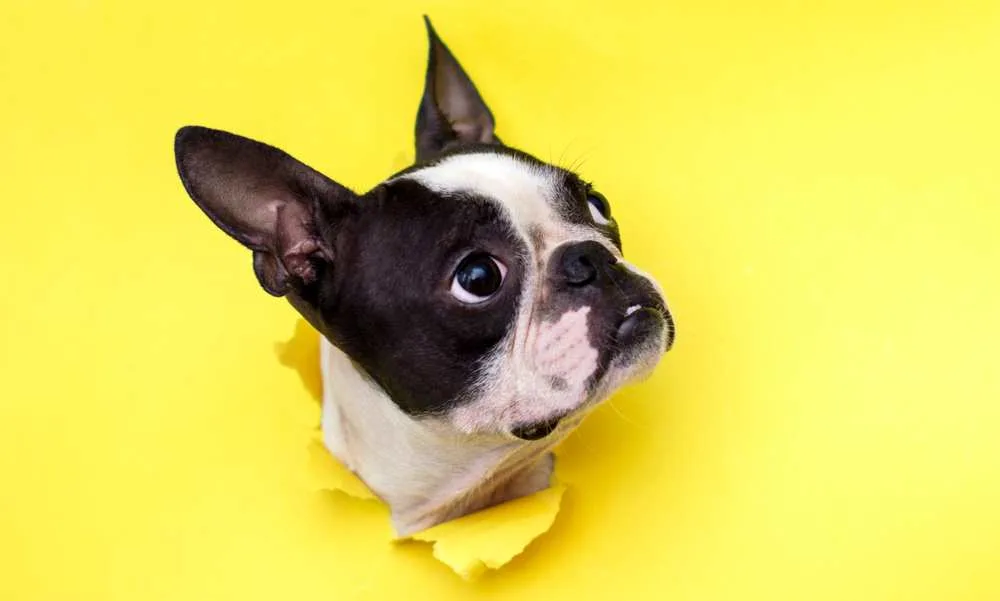
What Are Potatoes Made Of?
Potatoes are made up of mostly water and carbs, with some proteins and very little fat.
You should keep in mind that carbohydrates are not very good for dogs in large quantities.
Knowing that also means that potatoes are generally not great for your pup because of the carb content.
There won’t be any serious problems in small amounts, but you should stick with normal dog food when you can.
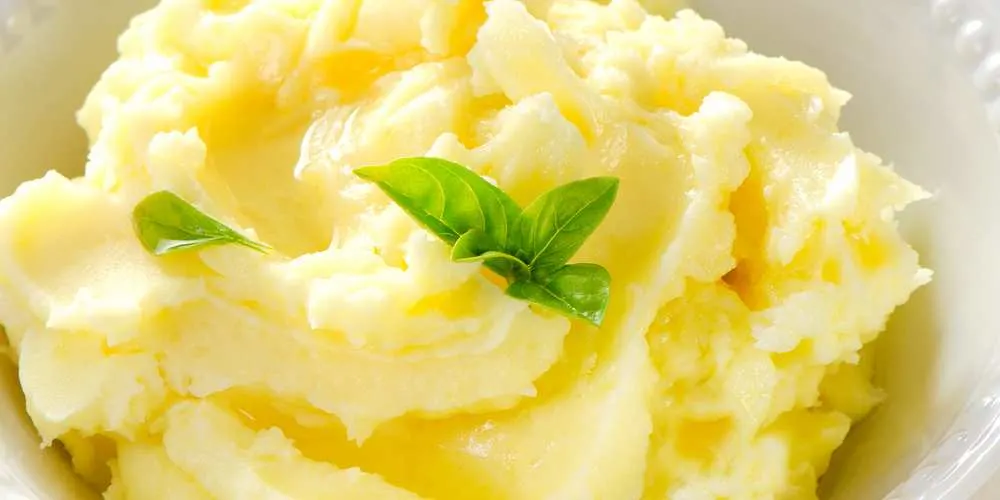
Feeding Your Dog Mashed Potatoes Safely
Potatoes are part of the nightshade family of plants, the same as tomatoes, for example. This group of vegetables can be harmful even to humans, let alone dogs.
The danger comes from a chemical called solanine.
This harmful chemical is very toxic, and you should do all you can to remove it from the potato.
Luckily, it’s mostly found in the peel of potatoes. To safely prepare mashed potatoes for your dog, make sure you peel the potatoes and boil them.
This will remove most, if not all, of the solanine from the spud.

So Why Can Mashed Potatoes Be Harmful To My Dog?
Most mashed potato recipes contain various ingredients that can be bad for your four-legged friend’s health.
Bearing this in mind, you may ask yourself can your pet have:
Garlic Mashed Potatoes
You should avoid feeding your pup mashed potatoes with garlic or onions.
These vegetables contain toxic chemicals that are bad for your dog’s blood.
If your pet eats too much garlic, he can get anemia, or at the very least, nausea or diarrhea.
Instant Or Boxed Mashed Potatoes
While it is a fast way to make yourself a quick meal, instant mashed potatoes are not good for your dog.
The boxed variants you can buy in grocery stores are full of salt and other additives.
High sodium intake can cause sodium poisoning in your dog. Also, his kidneys could get damaged too.
Mashed potatoes you buy in stores are often full of other spices such as onion powder, or various herbs that aren’t dog-friendly.
Mashed Potatoes With Corn
Maize is generally safe for your dog if you don’t feed him too much of the stuff.
Most dog food producers are using corn as an ingredient in their products because it’s cheap.
Still, you should make sure that your canine friend is not allergic to corn before you give him any.
A corn allergy may cause nausea, diarrhea, and stomach discomfort to your dog. If you know your pet isn’t allergic, you can feed him mashed potatoes with a little corn without any worries.
Mashed Potatoes With Added Peas
Peas are very healthy for your dog and can be included in mashed potatoes.
This small ball-shaped veggie is packed with various vitamins and minerals which are great for your pup’s health:
- Vitamin A – improves your dog’s eyesight. It’s also essential for your pet’s growth and development, and it boosts your dog’s immune system.
- Vitamin K – is great for your dog’s blood health and crucial for healthy bones.
- Various B vitamins – this group of 8 different chemicals plays an essential role in your pup’s whole metabolism.
- Iron – an essential mineral important for red blood cell production and health.
- Potassium – very important mineral for brain and nerve health in your pup.
- Magnesium – regulates your dog’s metabolism and also has useful benefits to all parts of his body.
- Zinc – is crucial for the development of your puppy and the proper function of his immune system.
Even though peas are beneficial to your dog, you should include small amounts of mashed potatoes for your pup.
They can cause gas in your pet’s stomach because of the high amount of fiber they contain, so don’t go overboard.
Mashed Potatoes With Butter, Milk, And Sour Cream
Almost every mashed potato recipe contains some of these dairy products.
If you’re making some for your dog, you should avoid adding them to his dish.
Sure, the high amount of calcium stored in dairy products is beneficial for canine bones and teeth, but these products have bad sides too.
Butter is high in fat and lactose because it’s made from milk. Foods with high-fat content can be harmful to your pet.
His pancreas can get damaged because it has to work over time to process the fat cells.
Also, many dogs have lactose intolerance. Since milk contains lactose, their bodies can’t break down these sugars.
This fact leads to various intestinal problems such as diarrhea, nausea, and other digestive problems.
If you’re making a batch of mashed potatoes, leave out the milk stuff from your dog’s meal.
Gravy Covered Mashed Potatoes
Gravy is a very often garnish for mashed potatoes. Although tasty for us, they’re not so good for canines.
The gravy contains high amounts of salt, fat and often it’s seasoned with onions too.
Too much salt can lead to many health problems, such as sodium poisoning and dehydration.
Fat is bad for your pup’s pancreas and blood. It increases cholesterol levels, which can also cause damage to the heart.
Onions and garlic are extremely toxic for dogs because they thin out their blood and can cause anemia.
Make sure to skip the gravy in your dog’s bowl of mashed potatoes.
KFC Mashed Potatoes
If you ask me, both you and your dog should avoid fast food in general. KFC mashed potatoes contain too much salt, so you should avoid it.
Also, as with all fast foods, KFC mash has many unhealthy additives, which are best avoided. It’s much better to make this treat yourself. That way you’re sure it’s not harmful to your pup.
Mashed Sweet Potatoes
This variant of potatoes is a healthier alternative to the usual white potato. You can feed your dog mash from this potato.
It’s widely used in a bunch of gluten-free, wheat-free, and grain-free dog food recipes.
You can also dry them or bake them to make some delicious treats for your pup!
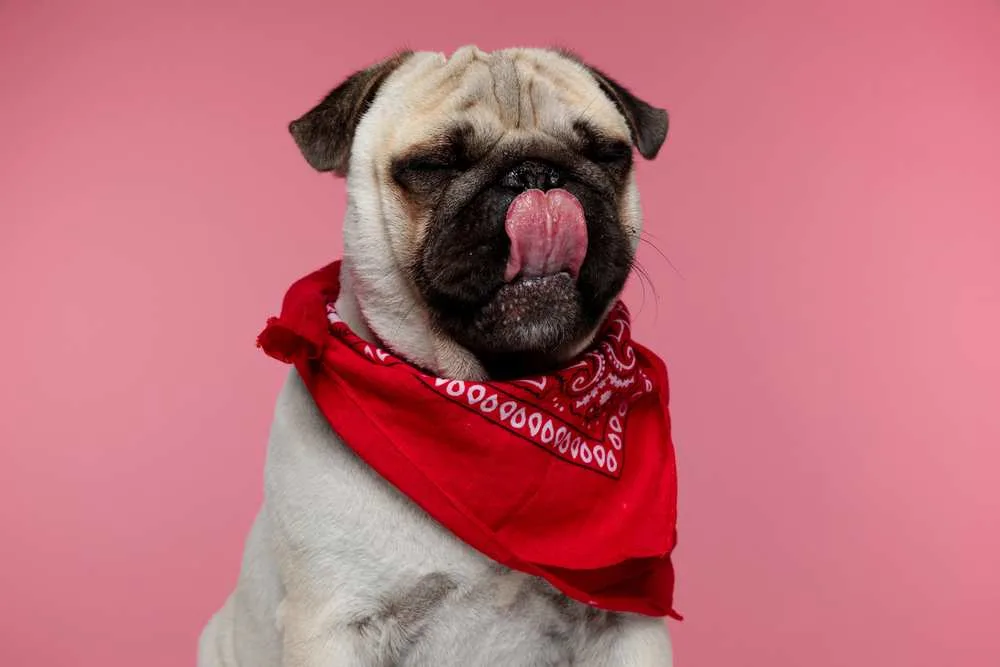
What Are The Health Benefits Of Mashed Potatoes For Your Dog?
Potatoes aren’t well-known for their nutritional values. They are mostly made of carbs and water.
Still, they do have some beneficial nutrients.
These vegetables have a nice amount of vitamin C. This essential vitamin helps your dog’s immune system fight off any infections and keeps him healthy.
Spuds are also rich in vitamin B6. This nutrient helps your pet’s body to absorb other nutrients and improve its metabolism.
Folate and potassium are also found in this veggie.
They help in the production of red and white blood cells, and are great for general health!
Putting aside all these health benefits, you should stick with feeding your dog his normal dog food.
After all, it is specifically made to provide your pet with all the nutrients it needs.
If you want to treat your pup with some mashed potatoes, don’t give him too much.
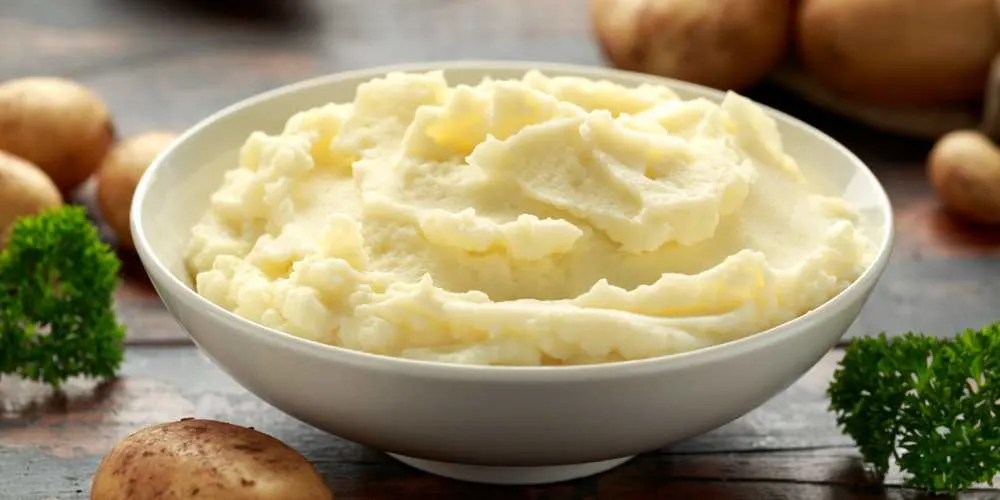
The Bottom Line
Dogs can eat mashed potatoes without any health risks.
You need to make sure you serve it to them the proper way.
Be sure to peel the potatoes and boil them. Otherwise, you risk poisoning your pup.
Never include any spices or additives in your mashed potato recipes. It’s best to make it from plain potato if it’s meant for your pup.
Avoid boxed mashed potatoes because they are filled with sugar and other harmful additives.
Buying this treat from fast food places is also to be avoided!
Some other veggies are ok to be included but don’t go overboard.
Sweet potato mash works great, and also you can make some crunchy chips from this healthy alternative to the white potato.
All in all, if you decide to share some of this tasty food with your canine friend, feel free to go ahead. Just don’t share too much!
Learn More: What Can Dogs Eat? A Comprehensive List Of Dog-safe Foods

